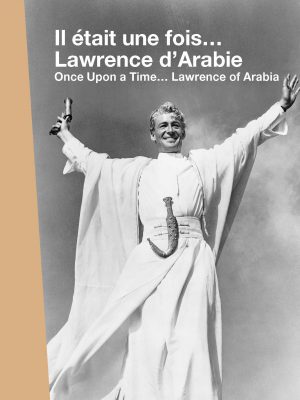ONCE UPON A TIME… LAWRENCE OF ARABIA
Official Selection: Cannes Classics – Cannes Film Festival 2008
| Director | Anne Kunvari |
| Writers | Anne Kunvari, Serge July, Marie Genin |
| Image | Nathalie Durand, Pierre Isnardon, Hervé Lodé |
| Sound | Ben Biles, Thierry Blandin |
| Editing | Barbara Bascou |
| Length | 52 minutes |
| Format | 16/9 |
| Versions | French and English |
| Broadcasters | France5, TCM, TSR, YLE, Canal+ Poland, EPT, RTBF, STV, TV Barrandov, SBS, STV |
Protagonists:
- Omar SHARIF, actor
- Kevin JACKSON, author of the book about the film
- Henzy LAURENS, historian of the Middle East
- Sandra LEAN, widow of David Lean
- Anne OATES, film editor
Portrait of a film: In 1935, a motorcyclist died on an English road: a former British intelligence officer who, between 1916 and 1918, had been the driving force behind the Arab revolt against the Ottoman Empire. The film chronicles these two epic years, on the margins of the First World War. Interpreted by Peter O’Toole, the young lieutenant Thomas Lawrence is sent on a mission to Cairo to meet the Emir Faisal, played by Alec Guiness. Fascinated by the desert and the Bedouins, Lawrence unites the tribes and becomes a charismatic leader. With his Arabic double, Sheriff Ali, played by Omar Sharif, he captures the Ottoman port of Aqaba… While taking some liberties with the historical truth, the film enhances the myth of Lawrence of Arabia, a unique example of a soldier and intellectual fighting in a chivalrous war. Adapted from the memoirs of Colonel Lawrence, the best-seller “The Seven Pillars of Wisdom”, shot in cinemascope in the grandiose landscapes of Andalusia and Morocco, the film was released in 1962. It was a global triumph, and won seven Oscars, including Best Film and Best Director.
Portrait of an era: When Lawrence of Arabia is released at the end of 1962, the two-sided world of the Cold War is in full balance of terror: after the construction of the Berlin Wall, the Soviets decide in extremis not to deploy missiles in Cuba. The France of General De Gaulle is slowly recovering from the nightmare of its last colonial war in Algeria. Great Britain is also hastening the decolonization of its former colonies in Africa and Asia, but has not yet surrendered the southern part of the Arabian Peninsula. Nationalism is triumphant all across the Arab world. Post-war negotiations, in which the real Lawrence took a very active part, result in the emergence of three kingdoms, Saudi Arabia, Transjordan and Iraq. Six years earlier, the British and French Suez military expedition against Gamal Nasser’s nationalization of the Egyptian Canal has turned into a fiasco. It is in this context that the film recounts the painful epic of a British man at the origin of the first Arab nationalism.
Portrait of a filmmaker: Born in London in 1908 into an austere Quaker family where cinema was banned, David Lean developed a secret passion for the 7th art. He began his career as an editor, directed his first film in 1942, and made a name for himself with his successful adaptations of two novels by Charles Dickens, “Oliver Twist” and “The Great Expectations”. Having just completed a Hollywood blockbuster, “The Bridge over the River Kwai”, which came out in 1957, He set out to direct “Lawrence of Arabia”. Although he became a mainstay of Hollywood, David Lean made only three other films before he died in April 1991: “Doctor Jivago”, another global success, “Ryan’s Daughter” and “The Road to India”, which had a less successful run.


 EN
EN FR
FR